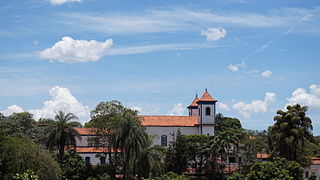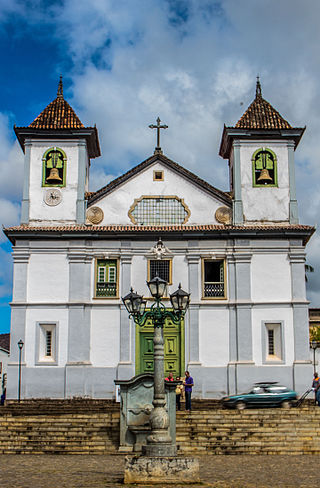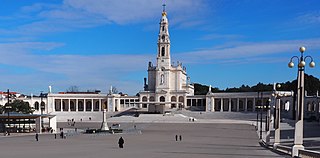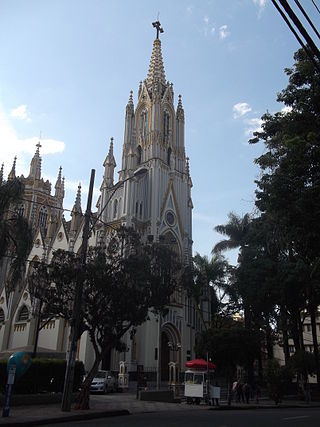
In Brazil, public holidays may be legislated at the federal, statewide and municipal levels. Most holidays are observed nationwide.

Our Lady of Aparecida, is a title of the Blessed Virgin Mary associated with the Immaculate Conception.

Sabará is a Brazilian municipality located in the state of Minas Gerais. The city belongs to the Belo Horizonte metropolitan region and to the associated microregion.

The Sanctuary of Christ the King is a Catholic monument and shrine dedicated to the Sacred Heart of Jesus Christ overlooking the city of Lisbon situated in Almada, in Portugal. It was inspired by the Christ the Redeemer statue of Rio de Janeiro, in Brazil, after the Cardinal Patriarch of Lisbon visited that monument. The project was inaugurated on 17 May 1959. The giant statue was erected to express gratitude because the Portuguese were spared the direct destructive effects of World War II.

The Cathedral Basilica of the National Shrine of Our Lady Aparecida is a prominent Roman Catholic basilica in Aparecida, Brazil. It is dedicated to Our Lady Aparecida as the principal Patroness of Brazil. Nossa Senhora Aparecida roughly translates to Our Lady Revealed. It is the largest cathedral and the second largest Catholic church in the world in interior area after the St. Peter's Basilica in the Vatican City.

The Roman Catholic Archdiocese of Belo Horizonte is an archdiocese located in the city of Belo Horizonte in Brazil.

The Roman Catholic Archdiocese of Mariana is an archdiocese based in the city of Mariana in the Brazilian state of Minas Gerais.

The Sanctuary of Fátima, officially titled Sanctuary of Our Lady of the Rosary of Fátima, is a Marian shrine dedicated to Our Lady of Fatima located in Fátima, in the municipality of Ourém, in Portugal. It consists of a group of Catholic religious buildings and structures with the Basilica of Our Lady of the Rosary as the main building.

A national shrine is a Catholic church or other sacred place which has met certain requirements and is given this honor by the national episcopal conference to recognize the church's special cultural, historical, and religious significance.

The Christ the King Cathedral, also known as the Belo Horizonte Cathedral, is a Catholic religious cathedral, currently under construction, located in Belo Horizonte, Minas Gerais, in Brazil. The building is the latest project of the renowned architect Oscar Niemeyer for the city and will be the headquarters of the Archdiocese of Belo Horizonte.

The Basilica Shrine of Our Lady of the Immaculate Conception, also known as the Basilica Sanctuary of Our Lady of the Conception, is a temple and seat of the Roman Catholic Diocese of São João da Boa Vista in Brazil. It is under the jurisdiction of the Catholic Church in the municipality of Caconde, in the northwest region of the state of São Paulo. It is the second oldest parish of the Diocese of Boa Vista and is dedicated to Our Lady of Good Success, having been created on March 19, 1775, by order of Manuel da Resurreição, third bishop of São Paulo.

The Basilica of Our Lady of Lourdes, also known as the Basilica of Belo Horizonte, is a Catholic church built in a predominantly neo-Gothic style, which is located in Belo Horizonte, Brazil. Its construction was completed around 1923. The author of the project was Manoel Tunes, and the works were made by Antonio Gonçalves Gravatá. In 1958 he was elevated to Basilica by decision of Pope Pius XII.

The Parish Church of Our Lady of the Rosary is a 17th-century Roman Catholic church in Cachoeira, Bahia, Brazil. Its construction began in the late 17th century and was completed in the 1750s, likely in 1754. The church was listed as a historic structure by National Institute of Historic and Artistic Heritage (IPHAN) in 1939. The church is dedicated to Our Lady of the Rosary and is constructed in the Baroque style.

The Church of Our Lady of the Rosary of Black Men was a Roman Catholic church located in Pirenópolis, in the Brazilian state of Goiás. It was built between 1743 and 1757 by a fraternity of black men, since Afro-Brazilians were forbidden from attending other local churches. It was demolished in 1944 by order of the Roman Catholic Diocese of Goiás. It was located where today stands the Praça do Coreto, which has a memorial in its honor. Of all the churches in the city, Our Lady of the Rosary of Black Men contained the most altars; seven in total. According to journalist Jarbas Jayme, these altars were "artistically carved and of costly and beautiful architecture". Its main altar is now located within the Mother Church of Our Lady of the Rosary and its two lateral altars are now located in the Church of Our Lady of Carmo.

The Church and Hospice of Our Lady of the Good Journey is an 18th-century Roman Catholic church located in Salvador, Bahia, Brazil. The church is dedicated to Our Lady of the Good Journey and belongs to the Roman Catholic Archdiocese of São Salvador da Bahia. It is located on the Itapagipe Peninsula and faces west directly onto the Bay of All Saints. The Church and Hospice of Our Lady of the Good Journey has a single tower with a frontispiece covered in blue and white azulejos in a zigzag pattern. It was listed as a historic structure by the National Historic and Artistic Heritage Institute (IPHAN) in 1938.

Our Lady of Good Voyage is a title of the Blessed Virgin Mary. It originated in seafaring communities of Portugal and Spain. The devotion spread as sailors traveled the world.

Maria da Conceição Santos, CIANSP, better known as Sister Benigna, was an Afro-Brazilian mother superior of the Congregation of Auxiliaries of Our Lady of Piety.



















